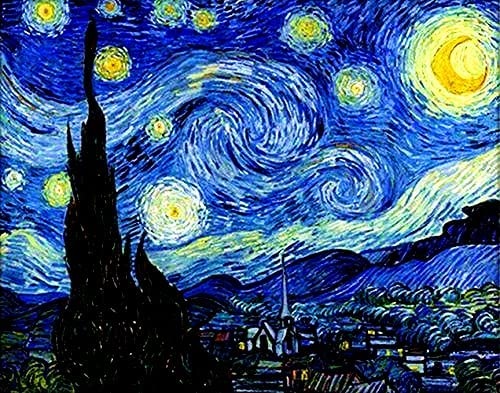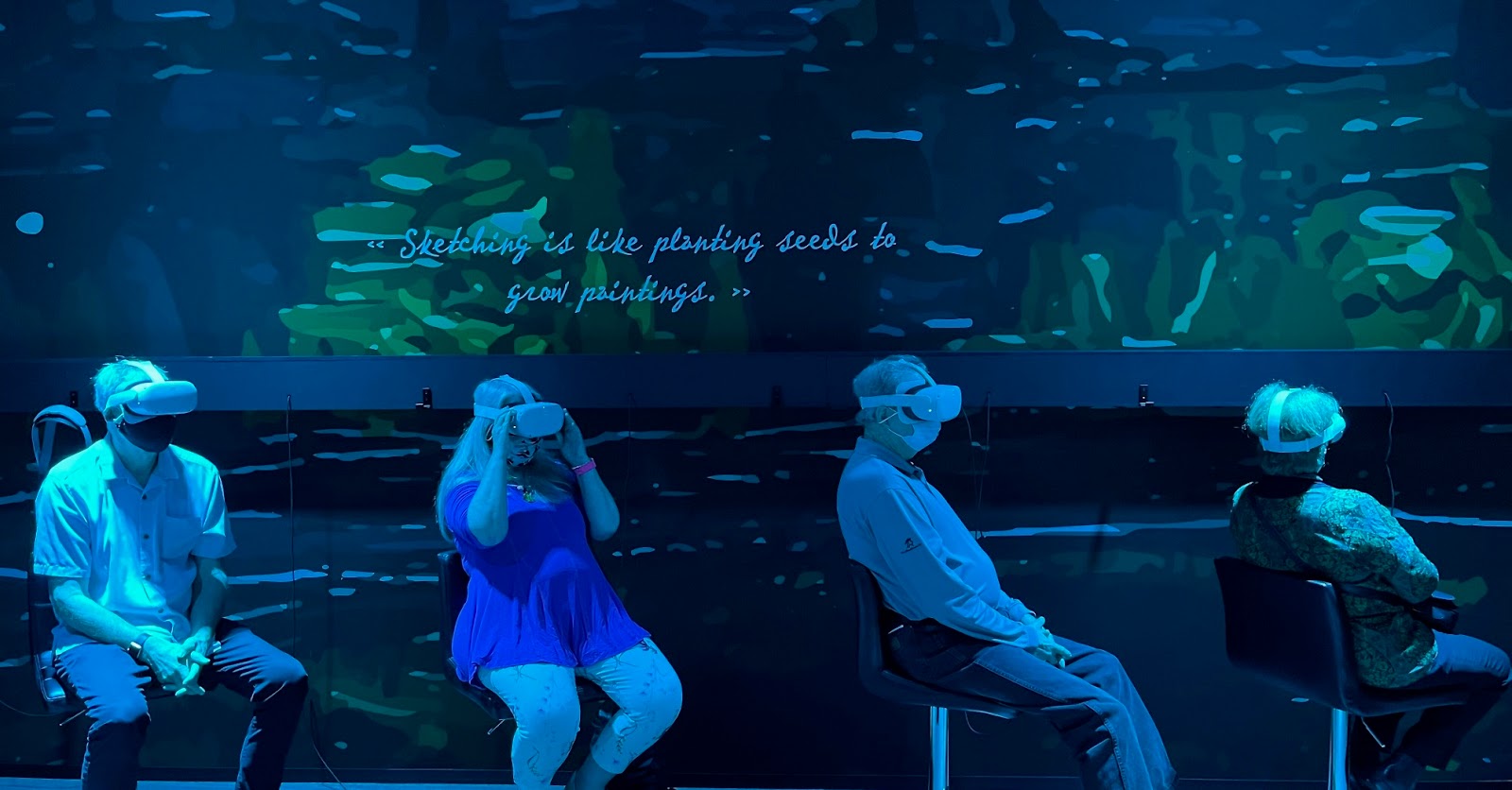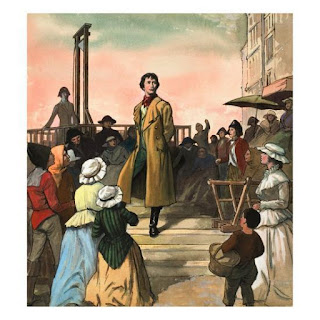TECHNOLOGIES THAT WILL CHANGE THE WAY STORIES ARE TOLD
By Kathryn Lane
Houston hosted Van Gogh: The Immersive Experience.
Not to miss an important event, Bob and I attended with friends from Angel
Fire. So many exhibits are hyped up that we did not know what to expect. Then we
left talking about what an amazing show we’d witnessed.
First, you glimpse blowups of Vincent’s paintings that come
together though electronic enhancement as you watch. Another room provides
photo ops were you can sit in Vincent’s
bedroom in Arles and have your picture taken.
 |
| Watch as Starry Night comes together electronically |
“Immersion” room where you witness, feel, and become part of Vincent’s
paintings as 90,000,000 pixels are projected in a 360° space, while you relax in a beach
chair.
 |
| Immersion Room with waiting beach chairs. |
.
 |
| In the Immersion room, don’t sit where the train will roar through. |
The show’s real clencher is the interactive historical journey that virtual
reality takes you on as you travel through Vincent’s fields, towns, and cafés.
This visually fabulous trip takes ten minutes. At times I had to remind myself
I was not flying. I was merely sitting on a sturdy chair as we swooped past
cafés and buildings, fields, country roads, and chapels. It’s a combination of
cinematography, art, music, and history where you are the observer.
 |
| The author, her husband, and friends with virtual reality headsets. |
Now that I’ve exuberantly told you about the Immersive experience,
I must also tell you I’m not getting a commission for tickets sales. But you
should definitely attend if it’s showing anywhere near you.
The real reason that I’m recounting the visit is that this show
gives you an incredible ride, but where it might fail is to engage your brain
actively, where your own imagination, intellect, and creativity work together
to connect the dots.
Maybe by experiencing projections of virtual reality in the future, the
human brain will be liberated to create even more sensational innovations. At
least that is my hope.
At times, it’s easy for negative thoughts to surface. Thoughts that younger
generations are not reading much and that the coming metaverse will create a
world where people will not have to solve issues; instead they might only
passively partake the virtual world placed before them.
Shows like Van Gogh’s Immersive, social media, and virtual
meetings using avatars are the beginnings of the metaverse. These phenomena will
change the world.
 |
| AVATAR |
We are on the cusp of changing how people learn, communicate, and
interact. These innovations had been on the horizon yet the isolation and
social distancing caused by the pandemic sped up the introduction and use of
these tools. Similar to the (almost instant) popularity of the world wide web
and the massive adaptation of mobile phones a little more than two decades ago,
we will soon grapple with metaverse technologies in everyday life.
 |
| Harry Potter Book |
As a writer, I think the coming technologies are both exciting and
scary. The creative opportunities promised by the metaverse seem exciting. On the
other hand, the metaverse will deliver powerful tools that will change how
stories are told. Will children in the future want to read Harry
Potter when they can experience it through virtual reality? Will people know
what their co-workers look like when all they see at virtual meetings are avatars?
And what about nature lovers? Will they don a headset to enjoy virtual nature
or will they commune with nature the old-fashioned way?
***
What do you think about the metaverse?
Kathryn’s mysteries – The Nikki
Garcia Mystery series:
https://www.amazon.com/gp/bookseries/B08C7V2675/ref=dp_st_1942428944
Kathryn’s short story collection – Backyard
Volcano and Other Mysteries of the Heart
https://www.amazon.com/Backyard-Volcano-Other-Mysteries-Heart/dp/1943306044
All available on Amazon
About Kathryn
Kathryn Lane started out as a starving
artist. To earn a living, she became a certified public accountant and embarked
on a career in international finance with a major multinational corporation.
After two decades, she left the corporate world to plunge into writing mystery
and suspense thrillers. In her stories, Kathryn draws deeply from her Mexican background as well as her travels
in over ninety countries.
Visit
my website at https://www.Kathryn-Lane.com
Photo
credits:
All
photographs are used in an editorial or educational manner
Starry Night by Van Gogh – public domain
Two Immersion Room photos – taken by the author
Four people with virtual reality headsets – taken with an iPhone
Avatar and Harry Potter book – public domain










The idea of total immersion in stories sounds fascinating, but I wonder what we'll miss of using our own imaginations.
That is my concern too.
Great post, Kathryn. I agree the concepts are both exciting and scary. I've not had a chance to do the Van Gogh immersive experience, but would love it if it comes near me.
Thank you! Glad you enjoyed the post.
You pose some very thought-provoking questions. I've wanted to see that Van Gogh exhibit. Now I realize how much I've missed.
Saralyn, thank you. I thoroughly enjoyed the show and yet it left me with so many questions about our future. Creativity is essential in life, and not just for writing books or creating shows, but in every walk of life. And I hope future generations increase their creative skills, not diminish them by merely waiting for others to do it for them.
Sounds like each venue for the Van Gogh modifies the experience somewhat. I thought it was great, but a bit overwhelming.// Thanks for the thoughtful questions. We don't know where we are heading or what the consequences will be for our evolution as human beings, but it is important to ask questions and think about it. Am currently watching one of my favorite fantasy books come to life on Amazon Prime (Wheel of Time). I am enjoying it but feel the pull to go read the book again, so maybe it (or even an immersive VR experience) will inspire people to read the books! The cost of providing the amount of material in a book as a visual/virtual production seems pretty huge. Playing in a virtual game world with character avatars is stil involves costs, but not nearly what hiring actors etc is. I guess we will see! Meanwhile, whatever direction it goes, creative content will always be needed. I suspect that many (like Captain Piccard) will still want their books.
T.K., I enjoyed hearing your take on VR and I agree the cost of producing a show like Van Gogh's Immersive is high. However with prices to see the show being as accessible as they are means that a lot of people in all stages of life can see it. As VR creates more and more stuff, the cost to produce is bound to diminish. But my concern is that creativity might be stifled in young people who are not taught to think creatively – I hope I'm wrong on this point. Thanks again for your thoughtful reply.
A very thoughtful post, Kathryn. Reminds me of my recent conversation with a friend who was worried that her 14-year-old granddaughter who is glued to her phone will lose interest in actual human contact and prefer the metaverse, where she can meet with friends virtually. As you say, positives and negatives. We can only hope the pluses outweigh the minuses.
Thank you, Gay. Insightful comment. And I also hope the positive will outweigh the negative in this new world.
I would have loved to see that exhibit. Wow! But then it's because I've seen and read about the artist and know his background, proven or just hyped in speculation. The Metaverse scares me because I think reading and escapism where we use our imaginations and not have some machine doing it for us is critical. One of my great fears is that one day the Internet goes down, along with massive technology, and no one can contact anyone because they don't know anyone's phone numbers or they don't know how to communicate outside of texting. Guess I'm one who's not completely sold on the metaverse. Great post!
Donnell, thanks for your thoughts. I also worry that the generation(s) growing up with the metaverse may lose the ability to think, create, and problem solve. Only those in positions producing innovation will continue to do those essential human activities, while the vast majority will lose out. Great response!